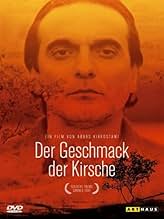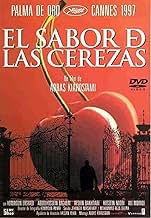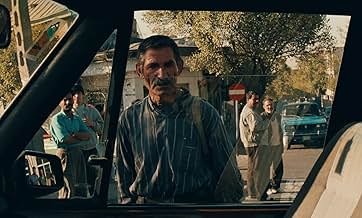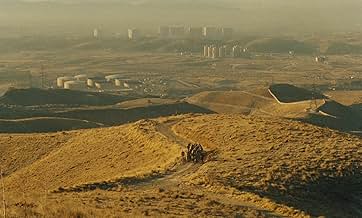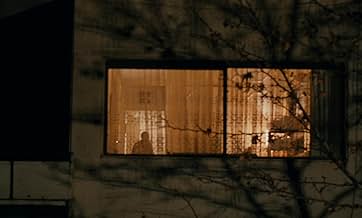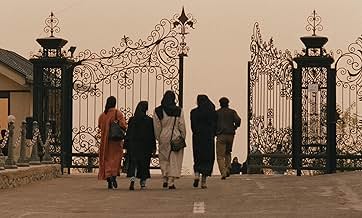Un Iranien conduit son camion et recherche quelqu'un qui l'enterrera tranquillement sous un cerisier après son suicide.Un Iranien conduit son camion et recherche quelqu'un qui l'enterrera tranquillement sous un cerisier après son suicide.Un Iranien conduit son camion et recherche quelqu'un qui l'enterrera tranquillement sous un cerisier après son suicide.
- Réalisation
- Scénario
- Casting principal
- Récompenses
- 3 victoires et 5 nominations au total
Avis à la une
worried that, as a filmmaker, Kiarostami would be as inaccessible
as Godard in the 80s. I was pleasantly surprised by A TASTE OF
CHERRY. It's a linear narrative, and the film's early ambiguity
concerning the driver's quest kept me guessing (I knew nothing
about this film going in, which was a real plus). The film's unusual
visual style, particularly the long unedited takes, works surprisingly
well for this type of story. I can understand why traditional
American filmgoers would be bored to tears by A TASTE OF
CHERRY, but for fans of independent and foreign film, it's a
worthwhile investment of your time. It probably works better with
an older audience that can identify with the world-weary
characters.
Through the dialogue between different people from different classes, everyone has his own attitude about "life & death". I think we can't say which is right & which is wrong. Abbas only gives it to us & let us think for ourselves.
Every scene is simple & ordinary, but has a certain strange fascination. I have seen "Through The Olive Trees" before (also directed by Abbas). To be honest, I don't like it, although it's said to be a good film. But this one is different. "Go see it" is what I want to say.
From the beginning to the end, Kiarostami gives us a complex script of characters that we come into contact with, and as we learn about each one, we learn more about the idea of life. What makes the film very interesting for a Western viewer is that I find closer to Kiarostami's Iran after each of his films that I watch, and become more informed to it. We learn intimate details about the lives of several Iranians.
Throughout the film I found that, although like many of his films it was quite slow-paced, it contained the extraordinarily rich dialog that is expected of a Kiarostami film. His films advance through their rich dialog while using the dusty Iranian landscape as their backdrop. I found a lot of the cinematography to be terrific, viewing the city from a distance and looking into the dusty foot-hills on the outskirts of Tehran. It is more than poetic to see a man at the end of his rope searching through the dust and faces of Tehran's poor laborers for answers about life and death. In many ways, the film is a large metaphor for the human state of affairs.
The film culminates very well, and we all eventually find our own taste of cherry in the film. I always feel as if Kiarostami's films are a very philosophical experience, and are quite personal. In this sense, Kiarostami's films are amongst the best that I have seen.
However, they are undoubtedly slower paced than other films, and they require the viewer to detach himself from any western stereotypes that he has about film. This would not be a good film for somebody expecting action or a typical Western film, but rather, this would be a film that I would recommend only to those who are in the mood for an insightful, philosophical film that shows an alternative view of life. Overall, it was an emotionally powerful film that will stick out in my memory as all Kiarostami films do.
Iran has a very young film industry that doesn't have the money or resources that many other film industries have. For what the Iranian film industry has at its disposal, this film is an exceptional achievement!
This film is a great example of how the expression of human beings' feelings and ideas cannot be held back by censorship. Kudos to Kiarostami for creating a very heartfelt commentary on the effects of oppression on the human soul.
I was afraid that if I ended the movie where Mr. Badie laid down on his grave the spectator would be left with a great deal of sadness. Even though I didn't think the scene was really that sad, I was afraid that it would come out as such. For that reason I decided to have the next episode where we have the camera running as Mr. Badie was walking around. I wanted to remind spectators that this was really a film and that they shouldn't think about this as a reality. They should not become involved emotionally. This is much like some of our grandmothers who told us stories, some with happy and some with sad endings. But they always at the end would have a Persian saying which went like this "but after all it is just a story! . . . The very last episode reminds me of the continuation of life, that life goes on, and here the audience is confronted with the reality they had hoped that Mr. Badie would be alive and there he is a part of nature and nature still continues and life goes on even without Mr. Badie. And if one could really think about being or not being present in life, or if one thinks about it in terms of the real implication of such presence, one might not in fact engage in committing suicide at all. The person committing suicide might think that s/he is taking revenge from the society, nature, life, powers to be, and so on. But s/he don't realize that after a suicide life still goes on and things stay the way they are. I could interpret this in a different way. If my audience is as creative as I imagine them to be, they can take this in a variety of interpretations and I can sit here and every time make a different interpretation of it, as every time one can creatively reinterpret the reality. "
Le saviez-vous
- AnecdotesThe film was shot without a proper script, relying on improvisations.
- GaffesIn the opening scene, as Mr. Badhi is driving past laborers looking for work, the same middle-aged white haired man, wearing a checkered sweater vest, is seen twice.
- Citations
Mr. Bagheri: If you look at the four seasons, each season brings fruit. In summer, there's fruit, in autumn, too. Winter brings different fruit and spring, too. No mother can fill her fridge with such a variety of fruit for her children. No mother can do as much for her children as God does for His creatures. You want to refuse all that? You want to give it all up? You want to give up the taste of cherries?
- ConnexionsFeatured in Especial Cannes: 50 Anos de Festival (1997)
Meilleurs choix
- How long is Taste of Cherry?Alimenté par Alexa
Détails
- Date de sortie
- Pays d’origine
- Sites officiels
- Langues
- Aussi connu sous le nom de
- El sabor de las cerezas
- Lieux de tournage
- Sociétés de production
- Voir plus de crédits d'entreprise sur IMDbPro
Box-office
- Montant brut mondial
- 12 187 $US
Contribuer à cette page



